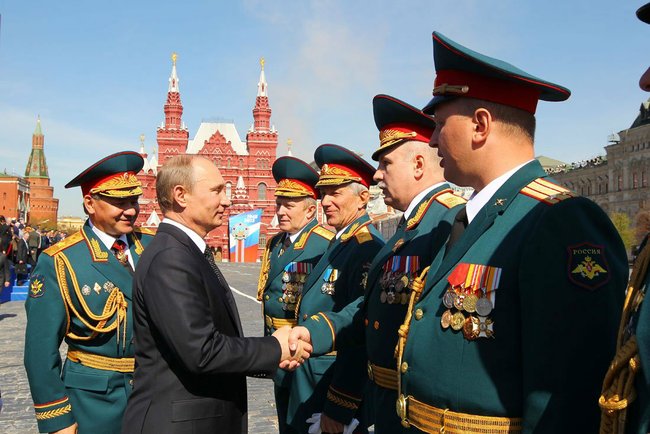Sometimes red, always imperial. What kind of country do the Russians expect? (Part 1)

Three decades after the collapse of the USSR, the Russians still miss the Soviet past, although they would not necessarily want it back. The red empire continues to be a great role model for Putin.
Maciej Pieczyński
“Those who do not regret the collapse of the USSR have no heart. And those who would like to rebuild it in its former shape have no sense”. This phrase was repeated by Putin many times and on various occasions. This paradoxical view, no matter how much it reflects the real feelings of the Kremlin ruler himself, seems to be expressed by the majority of Russian society. This is shown by subsequent public opinion polls. In 2016, on the occasion of the 25th anniversary of signing the Belovezh Accords1, the independent Levada Center (now officially recognized as a “foreign agent”) asked the Russians about their attitude to the previous system. 56 % of respondents expressed regret over the collapse of the USSR. While only 12% would have agreed to its reconstruction. However, nostalgia for the red empire is growing steadily. In a similar poll conducted in March 2020, the proportion of Russians lamenting the collapse of the USSR was already at 65 %, and as much as 28 % agreed with the idea of its possible reconstruction. In addition, 58 % of those questioned were in favor of Russia’s “separate path” and only 10 % declared its support for the path of Western European development.
Why do the Russians not necessarily dream of rebuilding the Soviet Union they clearly long for? Only seemingly these two attitudes are in contradiction with each other. Not all those who are sentimental about the USSR miss the red empire. Some miss the red, others miss the empire. Some do not want the return of the reds, others – who there are by far the least – do not want the return of the empire. The Soviet myth stands on two independent foundations of communism and imperialism.
RED FOUNDATIONS
Sergei Yastrzhembsky, a former diplomat and associate of both Yeltsin and Putin, in an interview for the daily Kommersant, when asked about the reasons for the growing longing for the USSR, stated that people of his generation (born in 1953), and especially those who are 20 years older, were “infected with social infantilism” by the previous system. “These are people who got used to living at the expense of the state. They failed to adapt to the new reality. A very difficult reality” – this is how Yastrzhembsky explained the pro-Soviet sentiments of his countrymen. In addition, in his opinion, the poor sincerely miss the USSR, and this is a very large group today – about 20 million Russians are living on the verge of poverty. In turn, among young people, according to Yastrzhembsky, sympathy for the Soviet Union results from ignorance of history and the emphasis of the bright sides of the previous period in the public sphere.
The interview is one of the episodes of the project called “30 years without the USSR”. In another interview in this series, the ombudsman for entrepreneurs under the Russian president, Boris Titov, said: “Society is turning left. Either it turns left by itself or it is ‘turned’”. Titov had in mind the economic left, by no means an ideological one. The diagnosis he presented in Kommersant is very pessimistic for the free market in Russia. “Most believe that the state is more effective, and business is stealing or robbing, because businessmen, as always, think about their own skin, not the nation” – he assessed. In his opinion, Russia is once again one foot in the USSR. The political dispute over the shape of the country is taking place between the center-left government and left-wing radicals. Part of the blame for this situation was placed on Alexei Navalny, who during the regional elections as part of the so-called wise voting (i.e. voting for every candidate from outside the party in power) supported, among others, politicians from the Communist Party of the Russian Federation. The radicalism of the opposition activist has led to a situation in which the political scene today lacks the strength that could at least try to defend the free market. On the other hand, power persecutes not only powerful oligarchs, but also even small businessmen. Not so much to eliminate their potential enemies, but rather to please a “nation”, which already traditionally hates “exploiters”. Titov tells in an interview how difficult it is to defend the rights of entrepreneurs in Russia today.
At the same time, the roots of the folk tradition of hatred of “classes in possession” go deeper than just seven decades of communism. Of course, the Soviets fueled this hatred, and with the help of state terror they cracked down on the “exploiters”. However, anti-elitism, understood in various ways, has for centuries been a very important feature of the Russian mentality. This is well reflected in the well-worn, but still accurate formula “good tsar – bad boyars”. The ruler and the people always found understanding over the heads of the elite, which in effect was shortened by these heads. To put it simply – the shoes of the boyars who were murdered by Ivan the Terrible, during the nineteenth-century tsarism were filled by pro-Western intellectuals, under the Bolsheviks – first came the aristocracy, then richer peasants, and finally: the “old Bolsheviks”, liquidated by Stalin. And under Putin – initially oligarchs, today more and more often also ordinary entrepreneurs. In addition to Orthodoxy and self-possession, one of the three main ideas officially worshiped in the Russian Empire was folk. The first state in the world to be conquered by the communists, even before the revolution, was not a workers’ state, but still a peasant one. Even Russian conservatives, including revolutionist-hating Fyodor Dostoyevsky, rejected capitalism and saw the country’s future in the people. Anti-individualism and collectivism, which grew partly from Orthodoxy, partly from native, conservative socialism, were not decreed by Lenin – instead, these concepts were taken over and brought to a criminal extreme.
It is therefore not surprising that the “red” component of the Soviet legacy is still so important. One of the most important Kremlin propagandists, Vladimir Solovyov, once stated that in a country with such a harsh climate, capitalism would never exist, because without the help of the state or any community, even entrepreneurship and individual talents are not always enough to survive. Especially that, in line with the typical Russian tendency to go from one extreme to the other (which philosopher Mikhail Epstein justifies by, among others, the lack of a purgatory, i.e. a neutral sphere, in the doctrine of the Orthodox Church), when capitalism was introduced in Russia, it was really “wild” capitalism. The already quoted Boris Titov, who is hard to be suspected of pro-communist sympathies, admitted in an interview with Kommersant that the privatization processes in the 1990s were not fair. Bandits took over instead of businessmen. Instead of the free market – the lawlessness of the oligarchs.
(….)
1 accords which formed the agreements that the USSR had formally ceased to exist, establishing the Commonwealth of Independent States (CIS) as its successor.
This article was published in January 2022 in “Do Rzeczy” magazine.



